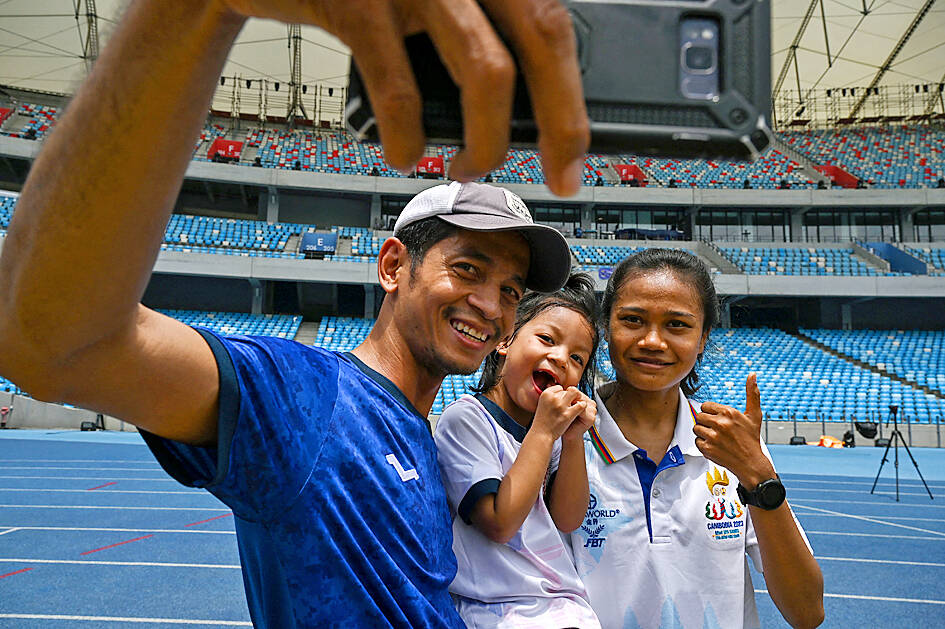Everyone in Phnom Penh, it seems, wants a selfie with Bou Samnang.
The Cambodian runner has become a star of the Southeast Asian Games since her gritty performance in the 5,000m. Although she came last, her determination to finish the race in torrential rain charmed the country and even won praise from Cambodian Prime Minister Hun Sen.
Videos of her crying after crossing the line have gone viral.

Photo: AFP
“I can say now I’m famous,” the 20-year-old said at the Morodok Techo National Stadium, the scene of her unlikely rise to prominence, where passers-by were lining up for photographs with her.
“Although I lost, they support me from the bottom of their hearts,” she said.
This week’s race was not the first time Bou Samnang has had to show determination, but is the latest step on an athletics journey that started on ill-equipped dirt tracks and has defied health problems and bereavement.
“I knew I was losing. The rain was so heavy,” said the Phnom Penh native, whose mother is a housewife and whose father died in an accident a few years ago.
“I had the right to abandon the race, but first I have a duty to represent Cambodia. So I did not give up,” she said.
When she first started running at secondary school on the capital’s outskirts, facilities were spartan.
“We lacked everything to support training,” she said. “I had only one pair of shoes, almost no sports shirts. We just trained on normal surfaces, like flat concrete or sometimes just on the dirt ground.”
She joined the national athletics program in 2016 and started to receive more support, before making the main squad five years later. She spent much of last year in China training for her country’s first ever home Games.
However, she has had anaemia for a long time and was feeling weak on the day of her big race.
“My trainer said because of my health condition I should not do it, but because of the nation, I committed myself to the race,” she said.
The eventual winner was Vietnam’s Thi Oanh Nguyen, one of the region’s finest athletes. Five minutes later, after the heavens opened, Bou Samnang was still going.
“I tried to reach the finish line, because I wanted to show people that in life, even though we go a bit slow or fast, we will reach our destination all the same,” she said. “So we should not give up. We should try our best.”
The rain-sodden Cambodian finished in 22 minutes, 54 seconds, just under 6 minutes after Oanh.
“When I reached the finish line, I was quite disappointed, because I did not win, but I was also happy; although they knew I lost the race, [supporters] encouraged me. I did not expect the video to go viral, I really thank them for their support,” Bou Samnang said.
Hosting the Southeast Asian Games is a big occasion for Cambodia, a country that has faced plenty of adversity itself, with civil war and genocide still in living memory. The government has in recent years tried to promote and fund sports in the run-up to the event.
Moved by her spirit, many officials and bodies have given Bou Samnang cash bonuses since the race, including Hun Sen, who said he gave her a US$10,000 reward “to encourage perseverance.”
“I will use the money to support my family,” Bou Samnang said, adding that she would like to pay off her mother’s debts and fund her own education.
She plans to enroll in university this year, to study IT and law, while continuing her athletics career. Some schools have already offered her scholarships.
She is still focusing on on the next Southeast Asian Games in Thailand.
“In the future, if there is an event in Thailand or other countries, I will try my best for the country,” she said. “I will try my best in the future to get the reward for my nation, and for my supporters.”

Tallon Griekspoor on Friday stunned top seed Alexander Zverev 4-6, 7-6 (7/5), 7-6 (7/4) in the second round at Indian Wells, avenging a devastating loss to the German at Roland Garros last year. Zverev, the world No. 2 who is heading the field of the prestigious ATP Masters event with No. 1 Jannik Sinner serving a three-month drugs ban, is the first Indian Wells men’s top seed to lose his opening match since Andy Murray in 2017. It was a cherished win for Griekspoor, who had lost five straight matches — including four last year — to the German. That included a five-setter

Five-time champion Novak Djokovic on Saturday tumbled out of the Indian Wells ATP Masters, falling in his first match to lucky loser Botic van de Zandschulp as two-time defending champion Carlos Alcaraz advanced. “No excuses for a poor performance,” 24-time Grand Slam champion Djokovic said after 37 unforced errors in a 6-2, 3-6, 6-1 defeat. “It doesn’t feel great when you play this way on the court,” he said. “But congratulations to my opponent — just a bad day in the office, I guess, for me.” Djokovic is just the latest in Van de Zandschulp’s string of superstar victims. He

Paris Saint-Germain on Tuesday held their nerve to beat Liverpool 4-1 on penalties and reach the UEFA Champions League quarter-finals after their tie finished one-apiece on aggregate, while Bayern Munich saw off Bayer 04 Leverkusen to complete a 5-0 win over both legs. Lamine Yamal and Raphinha fired Barcelona into the next round as the Catalans bested SL Benfica 3-1, and Inter booked a last-eight meeting with Bayern by seeing off Feyenoord 2-1. At Anfield, Ousmane Dembele netted the only goal of the night as PSG bounced back from Liverpool’s late winner last week to force the tie to extra-time and penalties. Maligned

The Taoyuan Pauian Pilots last night lost their East Asia Super League (EASL) championship game against Japan’s Hiroshima Dragonflies 72-68. They on Friday secured Taiwan’s first-ever spot in an EASL final with a 71-64 comeback victory over Japan’s Ryukyu Golden Kings. In what the EASL official Web site described as an “upset,” Pilots forward Lu Chun-hsiang on Friday asserted his stardom in Macau by scoring a game-high 24 points, with four players in both teams reaching double figures. The win was also the first time a Taiwanese franchise has defeated a Japanese team in the EASL Final Four. “I was moved